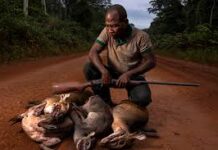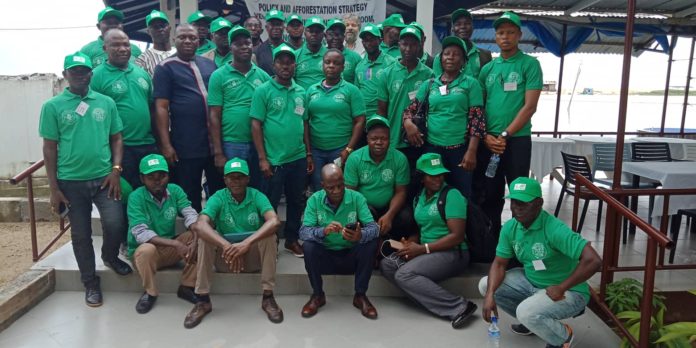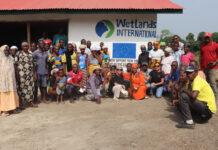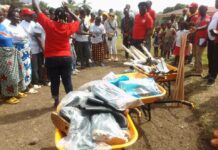A policy document which aims to brace the National Forestry reform law of 2006 and enforce the culture of reforestation and afforestation program in Liberia has been developed by stakeholders in Monrovia.
The policy document engrained with key solutions and recommendations seeks to encourage the replacement of the lost generation of trees while at the same time preventing the unwholesome habits of degradation of the forest.
Basically, the workshop considered a radical approach towards the consolidation of Liberia’s reforestation and afforestation polices and strategies in the wake of the threats and pressure on the forest in terms of wanton degradation and other illegal habits that have and continue to undercut the beauty of the forest which remains a huge and much admired treasure in the sub region.
As a matter of fact Liberia remains saluted and honored by the international community as being the home of the forest given her complaint nature to the practices and policies of conservation.
Currently, she has three key national parks-Grebo/Krahn, Sapo, and Gola in addition to several reserves and proposed protected areas. Against this background she is being dubbed by the global community as “hotspot” for conservation thus attracting the attention of conservation partners, the world over.
Given its relevance, the workshop brought together high level government officials including representation of a number of local government administration heads from Lofa, Margibi, Capemount, Monstserrado, Bomi, Nimba River Gee, Gbarpolu, and Bomg Counties and key partners working in the forestry sector.
The participants identified gaps and other potential threats and pledged to amalgamate efforts to ensure that this time around the story of national reforestation and afforestation will be practically achievable.
Sponsored by the International Tropical and Timber Organization (ITTO), the participants exhaustedly deliberated on key technical issues including the validation of plantations assessment report among other relevant matters all geared at finding workable solutions to make reforestation and afforestation project fully and legally operational in Liberia.
ITTO international consultant and Professor for International Forestry and Climate Change, Dr. Juergen Blaser described the workshop as a gateway to the growth and development of Liberia’s reforestation and afforestation program.
He thanked the administration of the FDA for understanding the ITTO program since it was introduced in Liberia as far back as 2007. He promised ITTO’s unrelenting efforts to make sure that the dream that gave birth to the project remains actively alive while registering his thanks and appreciation to the participants.
In his closing remarks FDA Managing Director, C. Mike Doryern recalled not only the longevity of ITTO in Liberia among other partners, he cherished its measurable role which he termed as a surest and workable therapy as far as the dream and national goal of conservation are concerned. He thanked the local government heads (county superintendents) for their support and cooperation thereby promoting the work of the FDA at the local level.
“We alone cannot succeed without you,” He emphatically stated, adding, “we are also happy that the members of the national legislature have begun to understand and embrace the work we do.” Mr. Doyern noted that it was time Liberia reassess and reexamine itself to grasp the importance of what nature has endowed us.
He stressed value addition to our round logs. Let’s us not give up the fight. Let’s find ways to invest in our plantations. He appreciated the dream and courage of the organizers of the workshop and the participants while pledging that FDA will remain firmly at the anchor to ensure that the ITTO program and project become a reality.
It can be recalled that in 2007 the ITTO began assessing the success and failure of Liberia’s forest plantations based on two areas of intervention identified by Chapter 8, Section 8.3 of the Liberia National Forestry Reform Law of 2006 and in compliance with the ITTO Sustainable Tropical Forest Management policy as defined in the ITTO Action Plan, with focus on:
- The identification of suitable sites for reforestation and afforestation activities; and
- The development of a national strategy to address deforestation and forest restoration and promote silvicultural practices that will expand and enrich the national forest endowment.
Unfortunately, the ITTO supported project was negatively influenced by the many problems that befell Liberia after the 14 years of civil crisis: collapse of the economy and social integrity, mass migration and internal displacement of citizens as well as the destruction of infrastructures and natural resources assets, including forests.
The two areas for interventions were identified at the time, based on an overall assessment of the priority needs of the forestry sector of Liberia in 2008, as part of the forestry reform process in the period of re-establishment of a functional forestry authority in post-war Liberia. The aim was to address, within the realm of the two areas of interventions, specific working areas within the wider forestry sector reform process including:
- The identification of suitable sites for reforestation and afforestation
- The valorization of the existing experience on industrial forest plantations
- The capacity-building in the field of forest restoration (reforestation and afforestation, agroforestry and timber stand improvement/enrichment planting; and
- The development of an outline for a national reforestation policy and afforestation strategy to be included in the Liberian broader forest sector development framework.

























